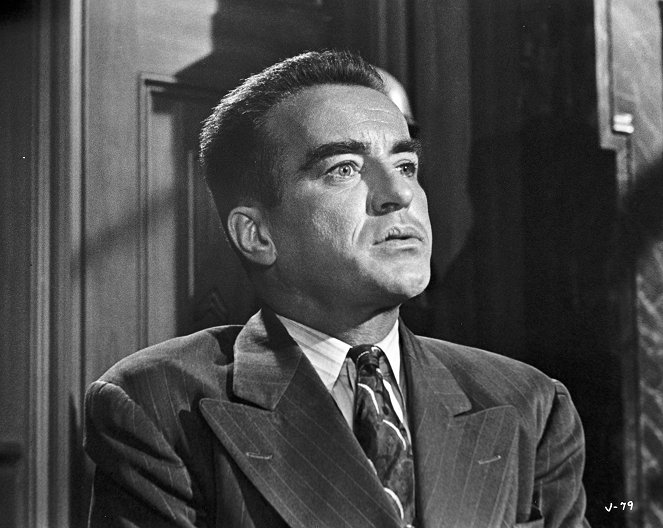Director:
Stanley KramerGuión:
Abby MannCámara:
Ernest LaszloMúsica:
Ernest GoldReparto:
Spencer Tracy, Burt Lancaster, Richard Widmark, Marlene Dietrich, Maximilian Schell, Judy Garland, Montgomery Clift, William Shatner, Werner Klemperer (más)Streaming (3)
Sinopsis(1)
En 1948, tres años después del final de la Segunda Guerra Mundial (1939-1945), cuatro jueces, cómplices de la política nazi de esterilización y limpieza étnica, van a ser juzgados en Nuremberg. Sobre Dan Haywood, un juez norteamericano retirado, recae la importante responsabilidad de presidir este juicio contra los crímenes de guerra nazis. (Filmin)
(más)Reseñas (5)
When one gives older films a chance, one can be deservedly rewarded. This is also the case with the movie Judgment at Nuremberg, which not only boasts excellent casting but is truly a powerful and intriguing discourse on what justice is, who bears responsibility, and who is truly guilty. Not a single bad acting performance here!
()
The genesis of Stanley Kramer's Judgment at Nuremberg was interesting in itself. Preceding the full-length film was a television adaptation from the series Playhouse 90 (1959), written by Abby Mann, with Maximilian Schell and Werner Klemperer retaining the same roles in both productions. The main events have already taken place in Nuremberg, and the drama takes place in 1948. No longer standing in front of the law are the Nazi elite, but a much lower rank, often relatively ordinary people... The timing of the premiere was excellent, as the trial of Adolf Eichmann was taking place in Israel. The biggest asset of the film version is the character of Mrs. Bertholt, which Marlene Dietrich created based on memories of her own mother (and won the David di Donatello award for it). She followed up on her earlier American film set in post-war Germany, A Foreign Affair. She expressed her views on the topic once again in the documentary Black Fox: The True Story of Adolf Hitler. Thanks to her, the testimony of both films was much more understandable and purposeful, because it is simply not possible to judge in black and white from the perspective of the winners.
()
A powerful film with brilliant dialogue, refreshing historical memory and, in the character of Spencer Tracy, a portrayal of the moral strength of an individual for whom justice always prevails over political interests. And on top of that, a double pleasure, from the masterful acting, where one must single out Maxmilian Schell, whose defence lawyer’s devotion reminded me in places of the infamous Bolshevik prosecutor Urvalek, and the orgiastic experience of the old Czech dubbing school (and I am not a fan of dubbing at all), which in the time of K.M.Walo and others was the best in the world.
()
Judgment at Nuremberg understandably utilizes the interesting and emotional topic of war crimes and their punishment, and partly the high reviews are also caused by that. On the other hand, the screenplay is of high quality and fully utilizes all the possibilities that the subject matter provides. It deals with all the conflicts and dilemmas that occurred at that time, and although it is not completely historically accurate, it gives a good artistic account of this phenomenon in world history. Minor historical inaccuracies can of course be found, for example, in the scene where Beneš resigns and as a result, American troops are mobilized. They were mobilized during the February events. Beneš resigned a few months later when the situation was already fully "stabilized," and the Americans naturally remained calm. From a directorial point of view, Stanley Kramer made the situation easier by selecting actors who fully correspond to the stereotypes that the audience expects from characters in a courtroom drama. If he were more daring and proceeded the same way as Forman, who cast a beautiful actress with an innocent face as the main antagonist in One Flew Over the Cuckoo's Nest, this film would be more interesting. However, it corresponds to the time of its creation. Overall impression: 80%. By the way, the essence of dealing with the Nazi past consisted of a compromise with the then-German political elite, and, for example, Nazi generals escaped with ridiculously low sentences and were released after a very short time. In this respect, the film hit the nail on the head...
()
I've always felt quite comfortable and not bored at "movie" trials, but I've really never been hit over the head with 170 minutes of dialogue and legalese with such intensity as I was at the Judgment at Nuremberg. Firstly, my stomach twisted with disgust at the evidence against the Nazi "patriots", and then I was literally drowning in ecstasy from all the excellent performances, the atmosphere built on the gorgeous dialogues and a little bit from the old Czech dubbing, which does no shame to the original. Spencer Tracy and his character of the wise judge perfectly reflect the majority society's view of the horrors in question, while the heroic orator Schell simultaneously identifies the most repulsive but sympathetic defence attorney ever to appear in a film. I sat down in front of the TV at seven in the evening, and at ten I numbly peeled myself away, amazed and startled by the information I had gleaned, and also by Tracey's final sentence, which might stay in my head forever. 100%
()


Anuncio